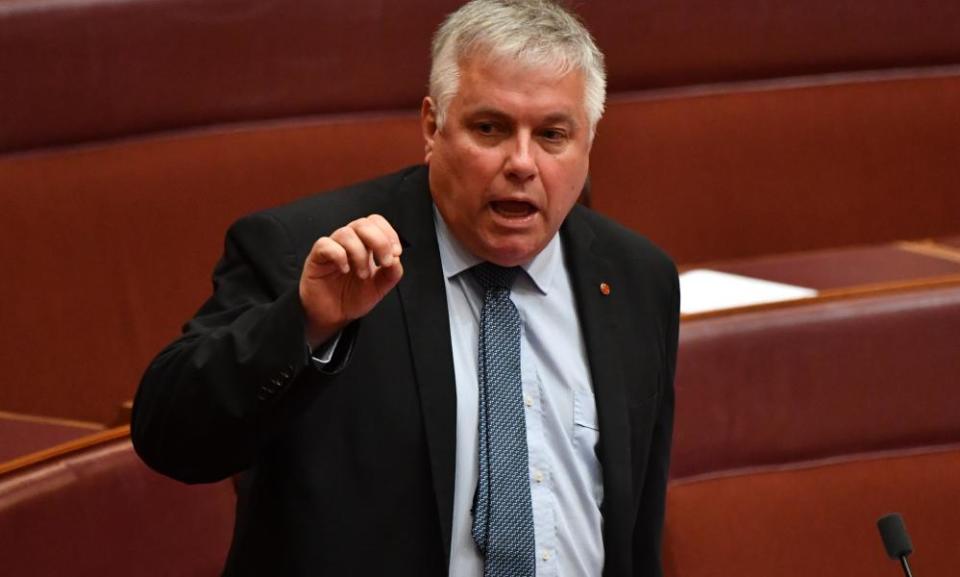Rex Patrick wins FoI case to release national cabinet records

The parliamentary committee scrutinising the Morrison government’s handling of the pandemic will demand a trove of secret documents after an extraordinary judgment finding national cabinet records can be accessed under the freedom of information regime.
The first-of-its-kind case in the Administrative Appeals Tribunal was brought by Senate crossbencher Rex Patrick, who argued the prime minister had no grounds to extend cabinet confidentiality to his national cabinet meetings with state premiers and chief ministers.
Related: ‘Australians are the winners’: Scott Morrison defends controversial commuter car parks fund
Justice Richard White agreed, finding the national cabinet was not, as the prime minister had contended, a subcommittee of the federal cabinet.
White concluded none of the documents sought by Patrick under FoI were an “official record of a committee of cabinet” and were, therefore, not covered by the cabinet exemption.
Katy Gallagher, the shadow finance minister and chair of the Senate select committee on Covid-19, told Guardian Australia she would move for immediate disclosure of key documents outlining the pandemic response.
“This is a devastating judgment for the prime minister, who was the architect of a structure specifically designed to avoid transparency and to refuse access to information that is genuinely in the public interest,” Gallagher said.
“We have a long list of documents that have been kept secret under the so-called national cabinet defence that will be re-lodged and in light of this judgment we expect all the documents and information to be released immediately.”

Morrison created the national cabinet structure in a governance improvisation in March 2020, as the first wave of the pandemic hit.
The prime minister said later the national cabinet – which replaced the council of Australian governments – would function as a subcommittee of the regular cabinet.
The government argued in submissions that Morrison had the ability to “determine what a cabinet committee was”.
But White rejected that contention.
“This seemed tantamount to a submission that any committee may be a committee of the cabinet for the purposes of the FoI Act merely because the prime minister of the day has purported to establish it as such,” he said.
White argued Morrison did not establish the national cabinet, but rather the prime minister agreed to the overhaul in the previous governance structure along with other first ministers. The judge noted the federal cabinet did not establish the national cabinet either.
Patrick sought minutes of particular meetings. White noted the minutes he’d assessed in the case did not appear to be conventional minutes recording the substance of deliberations, but rather records of decisions. He noted Morrison routinely announced those decisions publicly, at press conferences after national cabinet meetings.
In arguing the documents should be kept secret, commonwealth officials argued disclosure would reveal an exchange of “accurate and candid information and ideas” between members of the national cabinet.
But White demurred. He said the documents he had seen would “result only in the disclosure of the formal outcomes of the discussion and deliberations without any revelation of the proposals or discussion which preceded it”.
Patrick declared the judgment a victory for transparency. “For almost 40 years Australians have had a legal right under the Freedom of Information Act 1984 to access information relating to intergovernmental meetings, subject only to a test of public harm.”
Related: Sports rorts: Coalition blocking release of Phil Gaetjens’ secret report, citing cabinet exemption
“Last year prime minister Morrison tried to take that right away,” Patrick said. “He did not ask the parliament to change the law, he just declared that national cabinet to be part of the federal cabinet, and as such, exempt under the cabinet secrecy exemption of the FoI Act.
“That arrogant declaration has now been overturned”.
Given the decision paves the way for documents to be accessed under FoI, the government is expected to appeal.
During the case in the AAT, the commonwealth foreshadowed its intention to appeal any adverse judgment. There is now a stay for 28 days for the government to consider its rights.

 Yahoo Movies
Yahoo Movies 